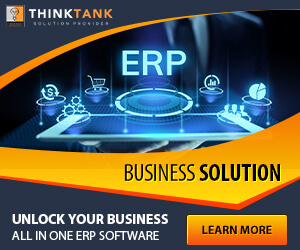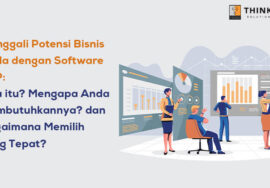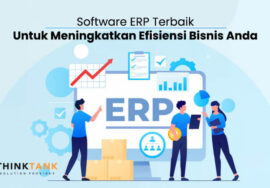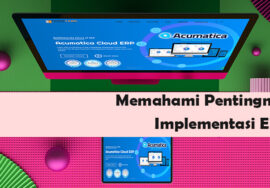The Essential Role of ERP in Business Success
The success of a business is dependent on its ability to efficiently manage its operations and maximize efficiency. Enterprise Resource Planning (ERP) software has become an integral tool for businesses looking to gain a competitive edge in the market. By leveraging ERP software, businesses can streamline processes, improve efficiency, reduce costs, and gain insights into their performance. In this article, we’ll explore the essential role that ERP plays in business success and discuss the benefits, challenges, and solutions it offers in order to help businesses make informed decisions to achieve long-term success. Get the best in ERP software with Acumatica and take your business to the next level!
What is ERP and how does it work?
Enterprise Resource Planning (ERP) is a powerful software that helps businesses manage their data, financials, and operations. It provides a single platform from which managers can access real-time information and make informed decisions. ERP systems are designed to automate processes that would otherwise require manual data entry, saving time and improving accuracy.
An ERP system typically contains modules for accounting, inventory management, customer relationship management (CRM), human resources (HR), and supply chain management. This allows businesses to have a single source of truth for all operations across the organization. The software collects data from all these modules and allows managers to view the information in real-time to make better decisions.
The core benefit of an ERP system is that it allows companies to streamline their business process, improve efficiency and reduce costs. With an ERP system in place, businesses can save time by automating mundane tasks such as record keeping or order processing while increasing accuracy with fewer errors due to manual inputting. Furthermore, ERP systems provide valuable insights into performance metrics such as customer satisfaction scores and production output which can be used for strategic planning purposes.
The bottom line is that an effective ERP system can provide huge benefits for businesses by making it easier to manage day-to-day operations, reducing costs while increasing efficiency and productivity. By understanding the role of ERP in business success, companies can make informed decisions on how best to leverage its power in order to achieve long-term success.
Benefits of using ERP in your business
The implementation of an ERP system can be a key factor in the success of any business, offering a range of immediate and long-term advantages. By streamlining processes and automating workflows, businesses can save time and resources while increasing efficiency and productivity. Furthermore, ERP systems provide transparency into data that is critical for decision making at both the organizational level as well as individual departments or teams.
Customization options allow managers to create tailored solutions that cater to unique requirements, while scalability ensures businesses can grow without outgrowing their existing software solution. Additionally, ERP systems grant companies the ability to track performance metrics in real-time so they can quickly identify any issues or bottlenecks before they become major problems.
Overall, an effective ERP system offers numerous benefits for those seeking improved operational efficiency and increased profits; however it is important that managers take the time to select the right solution for their specific needs in order to maximize its potential benefits successfully.
The challenges of incorporating ERP into your business
The introduction of an ERP system into a business can be daunting, and there are a variety of issues that must be taken into account. Acquiring and setting up the system can present a substantial financial investment, as well as the difficulty in syncing it with existing systems. Additionally, selecting the right type for your specific needs is essential to attain maximum benefits from the software.
Furthermore, personnel must receive adequate training on how to use the program correctly in order to make full use of it. This process could take weeks or months depending on its complexity, and updating of the software will need to occur in order to ensure security and efficacy over time.
Lastly, limited resources or personnel may hamper successful deployment of an ERP system. Without appropriate knowledge or experience, usage may become inefficient while data security can become compromised if access control measures are not applied properly.
For these reasons, careful thought should go into investing in an ERP system for long-term success within a business. All potential difficulties should be weighed prior to implementation in order for it to run smoothly upon rollout.
ERP solutions for different types of businesses
Enterprise Resource Planning (ERP) solutions are a valuable asset to businesses of all sizes. By providing scalable, customizable systems and the ability for quick integration with existing systems, companies can gain immense efficiency and cost-savings in comparison to manual processes. Additionally, ERP systems offer invaluable insight into performance metrics that can help managers make informed decisions about their business.
Investing in an ERP solution tailored specifically to the needs of your organization is the best way to ensure success in the long run. A quality provider will be able to provide training and ongoing support services that guarantee successful deployment and utilization of the system.
In conclusion, ERP solutions are an incredibly powerful tool for businesses of any size looking for increased efficiency and cost-savings alongside access to valuable decision-making data. Investing in a tailored solution from a reliable provider is essential if you want your business to take full advantage of this technology’s capabilities.
The future of ERP and its impact on business success
The future of Enterprise Resource Planning (ERP) software is one that promises to revolutionize the business landscape. As cloud-based systems become increasingly cost-efficient and scalable, companies can access sophisticated software and easily integrate it with other applications. Additionally, many providers are offering user-friendly and customizable solutions so businesses can tailor the ERP to their individual requirements.
One key innovation in ERP is its integration with Artificial Intelligence (AI). This allows for greater automation capabilities, enhanced customer insights, streamlined operations, and more personalized customer experiences. In order to benefit from these advantages, businesses must select a dependable provider who offers purpose-built solutions suited to their particular needs.
As technology advances further still, ERP systems will develop accordingly to meet changing business demands. Companies that invest in an appropriate system will be rewarded with long-term success due to the range of benefits provided by this cutting edge technology.








